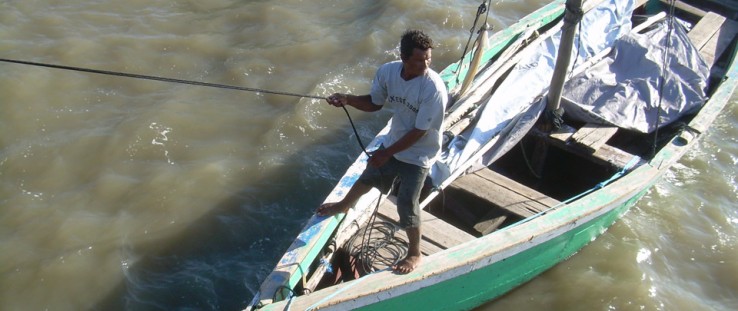 Honduran fisher in small-scale boat
Spiny Lobster Initiative
Honduran fisher in small-scale boat
Spiny Lobster Initiative
 Honduran fisher in small-scale boat
Spiny Lobster Initiative
Honduran fisher in small-scale boat
Spiny Lobster Initiative
Lobster tails from the Caribbean make for festive dining in restaurants and homes across the United States. Less well-known is how the coveted shellfish also provides livelihoods and food security for thousands of Hondurans.
In Honduras, most spiny lobsters come from the Miskito Coast, or La Moskitia, the most impoverished region in one of the poorest countries in the Western Hemisphere. However, high demand, poor resource management and the collection of immature lobsters have led to overfishing. And poor labor practices have led to disabilities and deaths among the divers, mostly poor indigenous Miskito Indians. There are currently over 1,000 disabled divers and over 10 deaths per year, according to a recent assessment by the Center for Marine Ecology, a Honduran-based organization.
USAID has focused on helping fishers and their industry make the trade safer, as well as more sustainable and profitable. And so has one of the world’s largest restaurant companies.
Darden Restaurants—owner of Red Lobster, Olive Garden, LongHorn Steakhouse and other restaurant brands with total annual sales of $8.5 billion—is one of the largest U.S. importers of lobster from Honduras. In 1993, the Orlando, Fla., business said it would not source lobster from any industrial scuba-dive fisheries, the sector deemed responsible for poor labor conditions, injuries and deaths.
The complex lobster fishery in Honduras intertwines issues related to environmental degradation, economic stability, governance, human health, labor and social justice. USAID believed tackling the problems required multiple partners and a comprehensive approach. So did Darden.
Together, they formed the Global FISH Alliance (G-FISH) in 2008 to promote sustainable and responsible fisheries practices so that both people and the natural resources they depended on could thrive.
To run the program, they enlisted the help of FHI 360, a not-for-profit that specializes in community-driven reform. In this case, the community of stakeholders involved in the spiny lobster value chain ranged from divers and boat owners to processors and buyers, as well as local environmental and social organizations, commercial banks and the Honduran Government.
Destroying Lives and Ecosystems
In Honduras, lobsters are caught primarily by industrial traps or fleets of scuba divers. The divers often use crowbars and other destructive methods to pry lobsters from reef crevices, damaging the Meso-American coral reefs. Healthy, productive lobster populations depend on healthy and biodiverse coral reef habitat.
As lobster stocks decrease, fishers have to dive deeper, longer and more frequently, increasing the danger. More than 4,000 Hondurans work in this industry.
Oswaldo Echeverria used to dive for a living but, in 2005, he witnessed the death of his cousin from decompression sickness while they were both diving for lobster. He was so rattled by the experience that he was unable to continue and later became an advocate for better labor conditions for divers.
Although numbers are difficult to determine due to lack of reliable record keeping, over the last 30 years, it is estimated that over 2,000 divers have been injured, and 300 have died as a result of unsafe diving practices. Decompression sickness or the “bends” may occur when scuba divers surface too quickly from deep depths, leading to rashes, joint pain, paralysis or death.
There is limited governance and no accountability placed on vessel owners and boat captains for scuba diving-related injuries.
The Miskito Indians do most of this dangerous work. Their home, the Moskitia, is thinly populated with barely 80,000 native inhabitants spread over more than 54,000 square kilometers of dense rainforests and few roads.
As the U.S. market demand for lobster increased in the 1970s and 80s, industrialization of the scuba-dive fishery became more intense. Safety protocols were ignored. Boats packed in divers beyond capacity. Due to poor resource management, divers were forced to make deeper dives looking for lobster, and to make too many dives each day.
While the diving businesses may be profitable for some, it comes at the expense of many lives. Honduras has more disabled patients and deaths from decompression sickness than any other country in the world.
Mothers and wives often bear the burden of caring for injured and paralyzed sons and husbands. Within eight days of the opening of the 2013 lobster fishing season, two lobster fishers had died in La Moskitia. In the small town of Gracias a Dios, Fidelia Maspin grieved for her son, Maspin Manister Morely. Seven days later, Maibet Valeriano also perished from unsafe diving. Yet, the authorities do not regulate fishing by scuba diving.
Political will to address major fisheries issues has been lacking. In 2009, Honduras signed a regional agreement that prohibited collection of lobster while scuba diving. However, the government continues to issue licenses each year. Moskito communities and industry leaders are becoming increasingly frustrated by the government’s lack of willingness to impose a ban on dive-fishing, and even different government ministries and factions have publicly stated opposing positions.
Fishing for Solutions
USAID and other partners have settled on trying a market-based approach that connected all the players along the value chain.
To start the reform process, G-FISH first met with community members to inventory issues from different perspectives and to identify opinion leaders, who were invited to join a 26-member working group made up of fishers, NGOs, industry, government and others. As a result, the Spiny Lobster Initiative (SLI) launched in 2009.
SLI identified the private sector—from processing plant owners to boat owners to exporters and importers—as the strongest economic and political influencers in the fishery. However, when the program started, a lack of coordination and trust prevented information from traveling among all the interested parties.
By holding regular meetings and four annual technical symposia on how to improve the fishery, the SLI and working group brought together more than 400 stakeholders affected by the fishery, creating greater dialogue and trust among the different trade associations.
According to Jimmy Andino, SLI director, the initiative has successfully created the space for all players along the value chain to discuss the complex issues surrounding the spiny lobster fishery. It has partnered with more than 80 local and international groups, businesses and the government.
“We enhance collaboration along the value chain, empower local stakeholders to address key threats to biodiversity and the fishery, and build stewardship to improve management,” said Andino.
The group hosted the first spiny lobster technical symposium in 2010, and industry associations are now supporting the annual technical forum.
Now industry members are moving towards formal certification of the fishery, which requires that concrete steps are taken to ensure ecological sustainability. Several key steps towards certification, such as mapping critical lobster habitat and creating lobster reserves, have already been undertaken.
Industry members are now strong advocates for reforming the lobster fishery. They have petitioned the National Congress to create a Fisheries Commission to address fisheries issues and have called for limiting the number of boat licenses, a crucial step towards a sustainable and profitable fishery.
Brandon Tidwell, Darden’s sustainability manager, says that helping ensure that Honduras’ lobster industry is environmentally sustainable and economically profitable is the only way to stay competitive in a global market. “We are committed to the ongoing efforts in Honduras to close the dive-caught fishery,” he says.
Divers Ascending
The current death rate within the dive fishery sector of Honduras is approximately 20 deaths per 2,500 divers. This is seven times higher than the most dangerous employment in the United States—also commercial fishing—with a death rate of three per 2,500 in 2012.
Part of the reason for this is that, traditionally, the Miskito divers have been geographically, socially and politically marginalized. They had little voice to influence and affect policy and were rarely invited to participate in discussions about their future health and livelihoods. SLI has brought the Miskito into the decision-making process and empowered the community to speak on their own behalf. Miskito representatives now negotiate for better contracting and diving practices with confidence, and request support for fisheries management workshops and the development of alternative livelihood projects.
“The Miskitos are Hondurans and we have the right to live in decent conditions. We do not want to be a social burden. We want to be local entrepreneurs,” said Capil Ulopio, who lost his son to diving in January 2012. He is now the president of the Disabled Miskito Divers Association and works closely with local and national authorities, advocating for the closure of the scuba-dive lobster fishery in Honduras and better living conditions for disabled Miskito divers.
The initiative has also helped the Miskitos develop an area for their exclusive use—1.5 million hectares of fishery grounds and cays in La Moskitia that will become the biggest protected marine area in Central America. The exclusive use rights for the Miskito Indian communities will be codified for the first time into a new Honduran National Fishery Law.
“The Lobster Initiative works very differently from other projects, doing a lot of promotion of the rights of the fishers in Honduras and making the Miskito known to the world,” said Erasmo Granuel, former director of the Disabled Miskito Divers Association in La Moskitia.
Injured in a diving accident in 2001, Granuel reflects on how the local communities have become empowered as stewards of conservation and look at artisanal, free-dive fisheries as a safer way to make a living. “The spiny lobster fishery in Honduras is a complex issue, but over the last several years, I have seen important changes in my people as they look for a safer way of fishing, where we have our own fishing area where we can fish by safer methods, feed our children and have some family income," he says. "That's all we need—another way for fishing, a better one.”
Know the Source of Your Lobsters
By Barbara Best
How can you help as a consumer of these delicious lobster tails in the United States? Become an informed consumer and know where your seafood is from and how it is sourced. G-FISH is working to ensure that other companies take a similar approach to Darden’s and stop buying dangerous, scuba-dive caught lobster.
G-FISH’s Know Your Source social marketing campaign is raising awareness among U.S. buyers and consumers about issues surrounding their lobster purchases. As a result of increased awareness, processing plants in Honduras began to separate scuba-dive versus trap-caught lobsters to serve more conscientious buyers and clients in the United States and Europe.
Building on the successes of the G-FISH program, Darden is partnering with a broad coalition to continue reform efforts of the lobster fishery and transition divers away from the dangerous industrial scuba-dive fishery. Greater demand for lobsters caught safely and environmentally will help in this effort. Your choice can make a difference—know your source of lobsters.







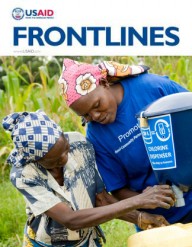

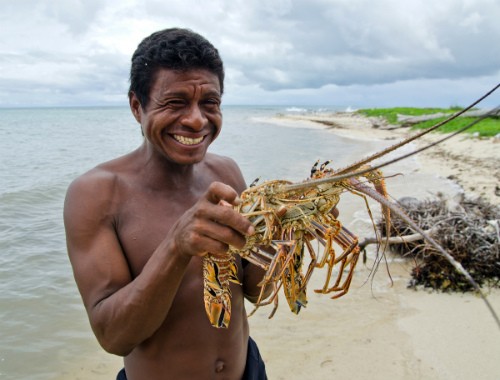
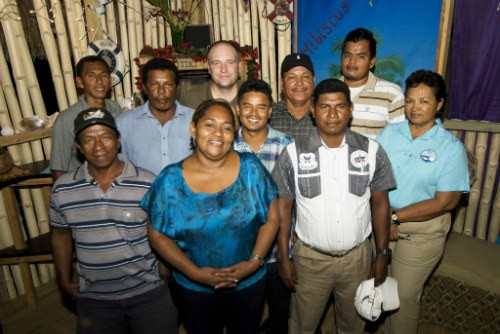
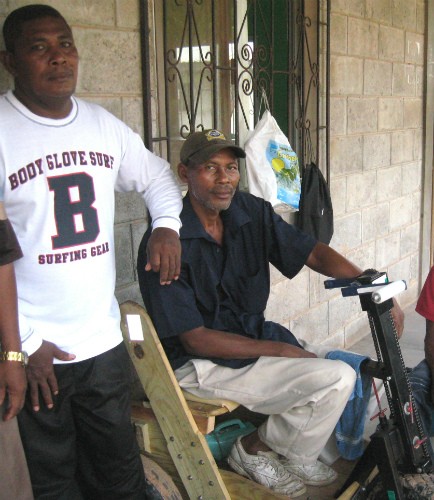
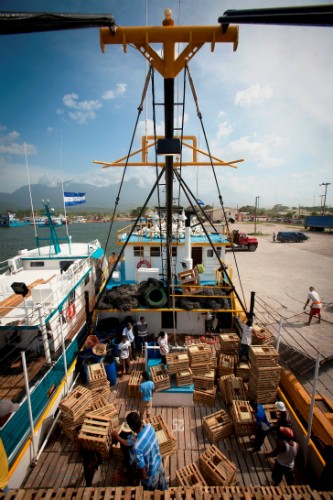
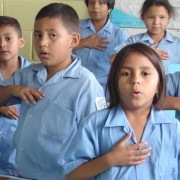
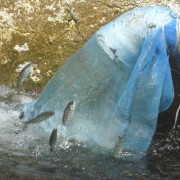
Comment
Make a general inquiry or suggest an improvement.